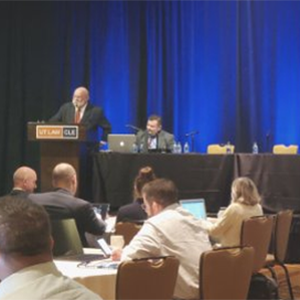
eCourse
Dark Sky Cities; Fair Housing Issues; plus Sovereign and Governmental Immunity Challenges
Contains material from Apr 2015
good course
Technical Questions?
512.475.6700
service@utcle.org
Session 2: Fair Housing: Limitations on Limitations - The Fair Housing Act prohibits discriminatory housing practices. Recently, parties have challenged the premise that disparate impact claims are cognizable under the FHA, a ground not yet endorsed by the Supreme Court. At the center of this claim is Texas’s effort to overturn the Fifth Circuit’s ruling ordering a city to allocate affordable-housing credits differently. The outcome could alter the manner in which low-income housing tax credits are allocated. An FHA case update is also included.
Session 3: Sovereign and Governmental Immunity in the Land Use Regulation Context - State and local governmental entities generally enjoy immunity from lawsuits. Suing or defending a governmental entity or its employees in a land use case can raise numerous issues, including the nature of immunity, the classification of the governmental action, and the identity of the defendant (i.e., the government entity or government officials).
Includes: Audio Paper Slides
Preview Sessions
Show session details
Alan J. Bojorquez, Robert J. Wood
Download session materials for offline use
Session 1
—37 mins
Dark Sky Cities (Apr 2015)
Review the municipal regulation of outdoor lighting and common law suits in unincorporated areas, including lessons learned from the City of Dripping Springs—the first municipality in Texas to be designated as a Dark Sky Community by the International Dark Sky Association.
Originally presented: Mar 2015 The Land Use Conference
Alan J. Bojorquez,
Bojorquez Law Firm, PC - Austin, TX
Robert J. Wood,
City of West Lake Hills - West Lake Hills, TX
Show session details
Bradford E. Bullock
Session 2
—28 mins
Fair Housing: Limitations on Limitations (Apr 2015)
The Fair Housing Act prohibits discriminatory housing practices. Recently, parties have challenged the premise that disparate impact claims are cognizable under the FHA, a ground not yet endorsed by the Supreme Court. At the center of this claim is Texas’s effort to overturn the Fifth Circuit’s ruling ordering a city to allocate affordable-housing credits differently. The outcome could alter the manner in which low-income housing tax credits are allocated. An FHA case update is also included.
Originally presented: Mar 2015 The Land Use Conference
Bradford E. Bullock,
Knight & Partners - Austin, TX
Show session details
Eric C. Farrar
Download session materials for offline use
Session 3
—27 mins
Sovereign and Governmental Immunity in the Land Use Regulation Context (Apr 2015)
State and local governmental entities generally enjoy immunity from lawsuits. Suing or defending a governmental entity or its employees in a land use case can raise numerous issues, including the nature of immunity, the classification of the governmental action, and the identity of the defendant (i.e., the government entity or government officials).
Originally presented: Mar 2015 The Land Use Conference
Eric C. Farrar,
Olson & Olson LLP - Houston, TX